2016 年浙江宁波大学翻译硕士英语考研真题
Part I. Vocabulary and Grammar (30 points: 20 for Section A, and 10 for Section B)
Section A: There are 20 incomplete sentences in this section. For each sentence there
are four choices
marked A, B, C and D. Choose the ONE answer that best completes the sentence.
1. Even though he was guilty, the ________ judge did not send him to prison.
A. merciful B. impartial C. conscientious D. conspicuous
2. The education ________ for the coming year is about $4 billion, which is much
more than what people expected.
A. allowance B. reservation C. budget D. finance
3. They had fierce ________ as to whether their company should restore the trade
relationship which was broken year ago.
A. debate B. clash C. disagreement D. context
4. They tossed your thoughts back and forth for over an hour, but still could not
make _____ofthem.
A. impression B. comprehension C. meaning D. sense
5. The politician says he will ________ the welfare of the people.
A. prey on B. take on C. get at D. see to
6. If you ________ the bottle and cigarettes, you’ll be much healthier.
A. take off B. keep off C. get off D. set off
7. He was ________ to steal the money when he saw it lying on the table.
A. dragged B. tempted C. elicited D. attracted
8. Beijing somewhat short sighted, she had the habit of ________ at people.
A. glancing B. peering C. gazing D. scanning
9. Of the thousands of known volcanoes in the world, the ________ majority are
inactive.
A. tremendous B. demanding C. intensive D. overwhelming
10. In general, matters which lie entirely within state borders are the ________
concern of state governments.
A. extinct B. excluding C. excessive D. exclusive
11. The food was rather ________ and needed gingering up.
A. slippery B. inscribe C. invisible D. insipid
12. I don't ________expert knowledge of this subject.
A. profess B. confess C. confirm D. confront
13. He had no ________ about his talents as a singer.
A. illuminations B. illustrations C. allusions D. illusions
14. There is not much time left; so I’ll tell you about it ________.
A. in detail B. in brief C. in short D. in all
15.In this factory, suggestions often have to wait for months before they are fully
________.
A. admitted B. acknowledged C. absorbed D. considered
16. There is a real possibility that these animals could be frightened, ________
a sudden loud noise.
�
A. being there B. should there be C. there was D. there having been
17. By the year 2000, scientists probably ________ a cure for cancer.
A. will be discovering B. are discovering C. will have discovered D. have discovered
18. Jim isn’t ________, but he did badly in the final exams last semester.
A. gloomy B. dull C. awkward D. tedious
19. The boy slipped out of the room and headed for the swimming pool without his
parents’ _______.
A. command B. conviction C. consent D. compromise
20. He had ________ on the subject.
A. a rather strong opinion B. rather strong opinion
C. rather the strong opinion D. the rather strong opinion
Section B: There are 20 blanks in the following passage. For each blank there are
four choices marked, A, B, C, and D You should choose the ONE that best fits into
the passage. Then mark the corresponding letter on the Answer Sheet with a single
line through the centre.
The human nose is an underrated tool. Humans are often thought to be insensitive
smellers compared with animals, __21__ this is largely because, __22__ animals, we
stand upright. This means that our noses are __23__ to perceiving those smells which
float through the air, __24__ the majority of smells which stick to surfaces. In
fact, __25__, we are extremely sensitive to smells, __26__ we do not generally
realize it. Our noses are capable of __27__ human smells even when these are __28__
to far below one part in one million.
Strangely, some people find that they can smell one type of flower but not another,
__29__ others are sensitive to the smells of both flowers. This may be because some
people do not have the genes necessary to generate __30__ smell receptors in the
nose. These receptors are the cells which sense smells and send __31__ to the brain.
However, it has been found that even people insensitive to a certain smell __32__
can suddenly become sensitive to it when __33__ to it often enough.
The explanation for insensitivity to smell seems to be that brain finds it __34__
to keep all smell receptors working all the time but can __35__ new receptors if
necessary. This may __36__ explain why we are not usually sensitive to our own smells
we simply do not need to be. We are not __37__ of the usual smell of our own house
but we __38__ new smells when we visit someone else’s. The brain finds it best to
keep smell receptors __39__ for unfamiliar and emergency signals __40__ the smell
of smoke, which might indicate the danger of fire.
21. A although B as C but D while
22. A above B unlike C excluding D besides
23. A limited B committed C dedicated D confined
24. A catching B ignoring C missing D tracking
25. A anyway B though C instead D therefore
26. A even if B if only C only if D as if
27. A distinguishing B discovering C determining D detecting
28. A diluted B dissolved C determining D diffused
29. A when B since C for D whereas
�
30. A unusual B particular C unique D typical
31. A signs B stimuli C messages D impulses
32. A at first B at all C at large D at times
33. A subjected B left C drawn D exposed
34. A ineffective B incompetent C inefficient D insufficient
35. A introduce B summon C trigger D create
36. A still B also C otherwise D nevertheless
37. A sure B sick C aware D tired
38. A tolerate B repel C neglect D notice
39. A available B reliable C identifiable D suitable
40. A similar to B such as C along with D aside from
Part II Reading Comprehension (40 points: 2×20)
Direction: There are four passages in this part. Each passage is followed by some
questions or statements. For each of them there are four choices marked A, B, C and
D You are expected to makethe best choice.
Questions 41 to 45 are based on the following passage:
Moral responsibility is all very well, but what about military orders? Is it not
the soldier’s first duty to give instant obedience to orders given by his military
superiors? And apart from duty, will not the soldier suffer severe punishment, even
death, if he refuses to do what he is ordered to do? If, then, a soldier is told
by his superior to burn this house or to shoot that prisoner, how can he be held
criminally accountable on the ground that the burning or shooting was a violation
of the laws of war?
These are some of the questions that are raised by the concept commonly called
“superior orders”, and its use as a defense in war crimes trials. It is an issue
that must be as old as the laws of war themselves, and it emerged in legal guise
over three centuries ago when, after the Stuart restoration in1660, the commander
of the guards at the trial and execution of Charles I was put on trial for treason
and murder. The officer defended himself on the ground “that all he did was as a
soldier, by the command of his superior officer whom he must obey or die,” but the
court gave him short shrift, saying that “when the command is traitorous, then the
obedience to that command is also traitorous.”
Though not precisely articulated, the rule that is necessarily implied by this
decision is that it is the soldier’s duty to obey lawful orders, but that he may
disobey—and indeed must, under some circumstances—unlawful orders. Such has been
the law of the United States since the birth of the nation. In 1804, Chief Justice
John Marshall declared that superior orders will justify a subordinate’s conduct
only “if not to perform a prohibited act”, and there are many other early decisions
to the same effect.
A strikingly illustrative case occurred in the wake of that conflict of which most
Englishmen have never heard (although their troops burned the White House) and which
we call the War of 1812. Our country was badly split by that war too and, at a time
when the United States Navy was not especially popular in New England, the
ship-in-the-line Independence was lying in Boston Harbor. A pass-by directed abusive
�
language at a marine standing guard on the ship, and the marine, Bevans by name,
ran his bayonet through the man. Charged with murder, Bevans produced evidence that
the marines on the Independence had been ordered to bayonet anyone showing them
disrespect. The case was tried before Justice Joseph Story, next to Marshall, the
leading judicial figure of those years, who charged that any such order as Bevans
had invoked “would be illegal and void”, and, if given and put into practice, both
the superior and the subordinate would be guilty of murder. In consequence, Bevans
was convicted.
The order allegedly given to Bevans was pretty drastic, and Boston Harbor was not
a battlefield;perhaps it was not too much to expect the marine to realize that literal
compliance might lead to bad trouble. But it is only too easy to conceive of
circumstances where the matter might not be at all clear. Does the subordinate obey
at peril that the order may later be ruled illegal, or is protected unless he has
a good reason to doubt its validity?
41. It can be inferred from Para. 1 that if a soldier obeys his superior’s order
to burn a house or to kill a prisoner, ________.
A. he is right according to moral standards
B. he should not receive any punishment
C. he should certainly be liable for his action
D. he will be convicted according to the law of war
42. What was the rule implied by the trail of the commander of the guards?
A. A soldier must obey lawful orders, be he right or wrong.
B. Even if an order is unlawful, the soldier must still obey it.
C. A soldier may or must disobey unlawful orders or he must die.
D. It is the soldier’s duty to obey superior orders whatever they are.
43. The phrase “to the same effect” (Line 6, Para.3) most probably means
“which”________.
A. are of the similar meaning B. have the same purpose
C. must be put into effect D. lead to the same result
44. According to the fourth paragraph, Bevans was found guilty because he ________.
A. obey illegal orders B. was accused of murder
C. disobeyed the superior orders D. offended against the law of war
45. It can be concluded from the last paragraph that the author’s attitude towards
Bevans was ______.
A. bewildering B. indignant C. approving D. not quite sympathetic
Questions 46 to 50 are based on the following passage:
Americans today don’t place a very high value on intellect. Our heroes are athletes,
entertainers, and entrepreneurs, not scholars. Even our schools are where we send
our children to get a practical education —— not to pursue knowledge for the sake
of knowledge. Symptoms of pervasive anti-intellectualism in our schools aren’t
difficult to find.
“Schools have always been in a society where practical is more important than
intellectual,” says education writer Diane Ravitch. “Schools could be a
counterbalance.” Razitch’s latest book, Left Back:A Century of Failed School
�
Reforms, traces the roots of anti-intellectualism in our schools, concluding they
are anything but a counterbalance to the American distaste for intellectual
pursuits.
But they could and should be. Encouraging kids to reject the life of the mind leaves
themvulnerable to exploitation and control. Without the ability to think critically,
to defend their ideas and understand the ideas of others, they cannot fully
participate in our democracy. Continuing along this path, says writer Earl Shorris,
“We will become a second-rate country. We will have a less civil society.”
“Intellect is resented as a form of power or privilege,” writes historian and
Professor Richard Hofstadter in Anti-Intellectualism in American life, a Pulitzer
Prize winning book on the roots of anti-intellectualism in US politics, religion,
and education. From the beginning of our history, says Hofstadter, our democratic
and populist urges have driven us to reject anything that smells of elitism.
Practicality, common sense, and native intelligence have been considered more noble
qualities than anything you could learn from a book.
Ralph Waldo Emerson and other Transcendentalist philosophers thought schooling and
rigorous book learning put unnatural restraints on children: “We are shut up in
schools and college recitation rooms for 10 or 15 years and come out at last with
a bellyful of words and do not know a thing.” Mark Twain’s Huckleberry Finn
exemplified American anti-intellectualism. Its hero avoids being civilized, going
to school and learning to read, so he can preserve his innate goodness. Intellect,
according to Hofstadter, is different from native intelligence, a quality we
reluctantly admire.
Intellect is the critical, creative, and contemplative side of the mind.
Intelligence seeks to grasp, manipulate, re-order, and adjust, while intellect
examines, ponders, wonders, theorizes, criticizes and imagines.
School remains a place where intellect is mistrusted. Hofstadter says our country’s
educational system is in the grips of people who “joyfully and militantly proclaim
their hostility to intellect and their eagerness to identify with children who show
the least intellectual promise.”
46. What do American parents expect their children to acquire in school?
A. The habit of thinking independently.
B. Profound knowledge of the world
C. Practical abilities for future career.
D. The confidence in intellectual pursuits.
47. We can learn from the text that Americans have a history of _______.
A. undervaluing intellect B. favoring intellectualism
C. supporting school reform D. suppressing native intelligence
48. The views of Ravitch and Emerson on schooling are ________.
A. identical B. similar C. complementary D. opposite
49. Emerson, according to the text, is probably _______.
A. a pioneer of education reform B. an opponent of intellectualism
C. a scholar in favor of intellect D. an advocate of regular schooling
50. What does the author think of intellect?
�
A. It is second to intelligence. B. It evolves from common sense.
C. It is to be pursued D. It underlies power. Questions
51 to 55 are based on the following passage:
There are good reasons to be troubled by the violence that spreads throughout the
media. Movies, television and video games are full of gunplay and bloodshed, and
one might reasonably ask what’s wrong with a society that presents videos of
domestic violence as entertainment. Most researchers agree that the causes of
real-world violence are complex. A 1993 study by the U.S. National Academy of
Sciences listed “biological, individual, family, peer, school, and community
factors” as all playing their parts.
Viewing abnormally large amounts of violent television and video games may well
contribute to violent behavior in certain individuals. The trouble comes when
researchers downplay uncertainties in their studies or overstate the case for
causality. Skeptics were dismayed several years ago when a group of societies
including the American Medical Association tried to end the debate by issuing a joint
statement: “At this time, well over 1,000 studies ... point overwhelmingly to a
causal connection between media violence and aggressive behavior in some children.”
Freedom-of-speech advocates accused the societies of catering to politicians, and
even disputed the number of studies (most were review articles and essays, they said).
When Jonathan Freedman, a social psychologist at the University of Toronto, reviewed
the literature, he found only 200 or so studies of television-watching and aggression.
And when he weeded out “the most doubtful measures of aggression”, only 28%
supported a connection.
The critical point here is causality. The alarmists say they have proved that violent
media cause aggression. But the assumptions behind their observations need to be
examined. When labeling games as violent or non-violent, should a hero eating a ghost
really be counted as a violent event? And when experimenters record the time it takes
game players to read ‘aggressive’ or ‘non-aggressive’ words from a list, can
we be sure what they are actually measuring? The intent of the new Harvard Center
on Media and Child Health to collect and standardize studies of media violence in
order to compare their methodologies, assumptions and conclusions is an important
step in the right direction.
Another appropriate step would be to tone down the criticism until we know more.
Several researchers write, speak and testify quite a lot on the threat posed by
violence in the media. That is, of course, their privilege. But when doing so, they
often come out with statements that the matter has now been settled, drawing
criticism from colleagues. In response, the alarmists accuse critics and news
reporters of being deceived by the entertainment industry. Such clashes help neither
science nor society.
51. Why is there so much violence shown in movies, TV and video games?
A. There is a lot of violence in the real world today.
B. Something has gone wrong with today’s society.
C. Many people are fond of gunplay and bloodshed
D. Showing violence is thought to be entertaining.
�
52. What is the skeptics (Line 3, Paragraph 3) view of media violence?
A. Violence on television is a fairly accurate reflection of real-world life.
B. Most studies exaggerate the effect of media violence on the viewers.
C. A causal relationship exists between media and real-world violence.
D. The influence of media violence on children has been underestimated
53. The author uses the term “alarmists” (Line 1, Paragraph 5) to refer to those
who ________.
A. use standardized measurements in the studies of media violence
B. initiated the debate over the influence of violent media on reality
C. assert a direct link between violent media and aggressive behavior
D. use appropriate methodology in examining aggressive behavior
54. In refuting the alarmists, the author advances his argument by first challenging
________.
A. the source and amount of their data B. the targets of their observation
C. their system of measurement D. their definition of violence
55. What does the author think of the debate concerning the relationship between
the media and violence?
A. More studies should be conducted before conclusions are drawn.
B. It should come to an end since the matter has now been settled
C. The past studies in this field have proved to be misleading.
D. He more than agrees with the views held by the alarmists.
Questions 56 to 60 are based on the following passage:
In the college-admissions wars, we parents are the true fighters. We are pushing
our kids to get good grades, take SAT preparatory courses and build résumés so they
can get into the college of our first choice. I've twice been to the wars, and as
I survey the battlefield, something different is happening. We see our kids' college
background as a prize demonstrating how well we've raised them. But we can't
acknowledge that our obsession is more about us than them: So we've contrived various
justifications that turn out to be half-truths, prejudices or myths. It actually
doesn't matter much whether Aaron and Nicole go to Stanford.
We have a full-blown prestige panic; we worry that there won't be enough prizes to
go around. Fearful parents urge their children to apply to more schools than ever.
Underlying the hysteria is the belief that scarce elite degrees must be highly
valuable. Their graduates must enjoy more success because they get a better education
and develop better contacts. All that is plausible — and mostly wrong. We haven't
found any convincing evidence that selectivity or prestige matters. Selective
schools don't systematically employ better instructional approaches than less
selective schools. On two measures — professors' feedback and the number of essay
exams — selective schools do slightly worse.
By some studies, selective schools do enhance their graduates' lifetime earnings.
The gain is reckoned at 2-4% for every 100-point increase in a school's average SAT
scores. But even this advantage is probably a statistical fluke. A well-known study
examined students who got into highly selective schools and then went elsewhere.
They earned just as much as graduates from higher-status schools.
�
Kids count more than their colleges. Getting into Yale may signify intelligence,
talent and ambition. But it's not the only indicator and, paradoxically, its
significance is declining. The reason: so many similar people go elsewhere. Getting
into college isn't life's only competition. In the next competition — the job market
and graduate school — the results may change. Old-boy networks are breaking down.
Princeton economist Alan Krueger studied admissions to one top Ph.D program. High
scores on the GRE helped explain who got in; degrees of prestigious universities
didn't.
So, parents, lighten up. The stakes have been vastly exaggerated. Up to a point,
we can rationalize our pushiness. America is a competitive society; our kids need
to adjust to that. But too much pushiness can be destructive. The very ambition we
impose on our children may get some into Harvard but may also set them up for
disappointment. One study found that, other things being equal, graduates of highly
selective schools experienced more job dissatisfaction. They may have been so
conditioned to being on top that anything less disappoints.
56. Why does the author say that parents are the true fighters in the
college-admissions wars?
A. They have the final say in which university their children are to attend?
B. They know best which universities are most suitable for their children.
C. They have to carry out intensive surveys of colleges before children make an
application.
D. They care more about which college their children go to than the children
themselves.
57. Why do parents urge their children to apply to more schools than ever?
A. They want to increase their children's chances of entering a prestigious college.
B. They hope their children can enter a university that offers attractive
scholarships.
C. Their children will have a wider choice of which college to go to.
D. Elite universities now enroll fewer students than they used to.
58.What does the author mean by saying "Kids count more than their college" (Line
1, Paragraph 4)?
A. Continuing education is more important to a person's success.
B. A person's happiness should be valued more than their education.
C. Kids’ actual abilities are more important than their college backgrounds.
D. What kids learn at college cannot keep up with job market requirements.
59.What does Krueger's study tell us?
A. Getting into Ph.D programs may be more competitive than getting into college.
B. Degrees of prestigious universities do not guarantee entry to graduate programs.
C. Graduates from prestigious universities do not care much about their GRE scores.
D. Connections built in prestigious universities may be sustained long after
graduation.
60.One possible result of pushing children into elite universities is that ______ .
A. they earn less than their peers from other institutions
B. they turn out to be less competitive in the job market
�
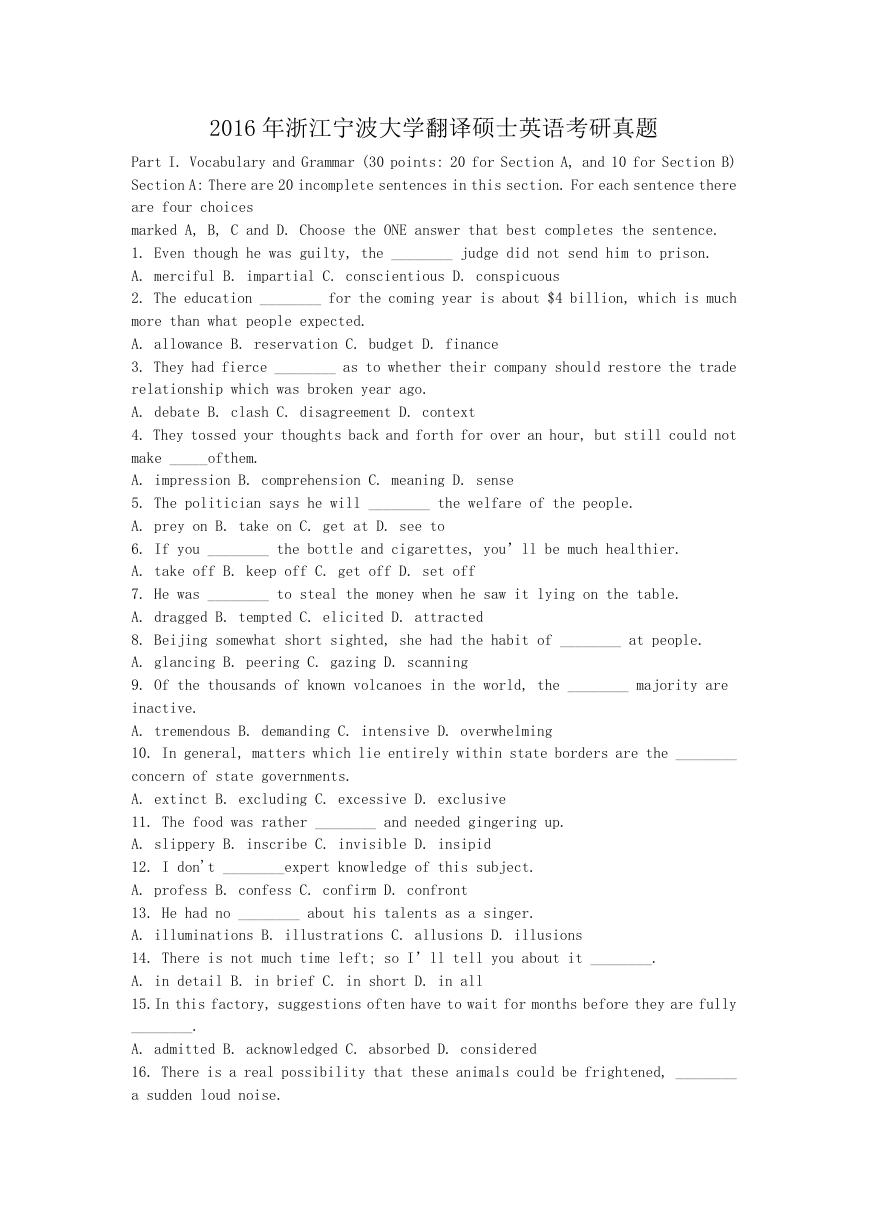
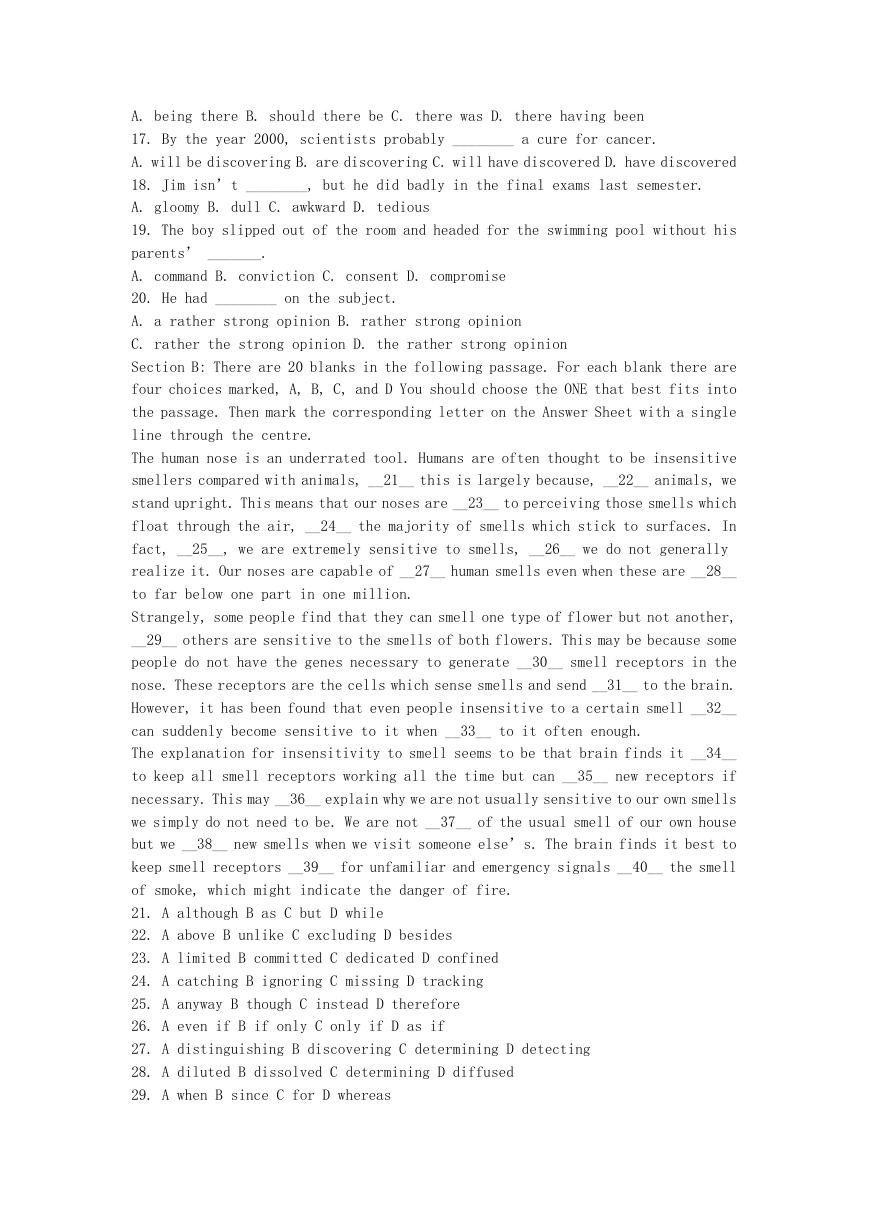

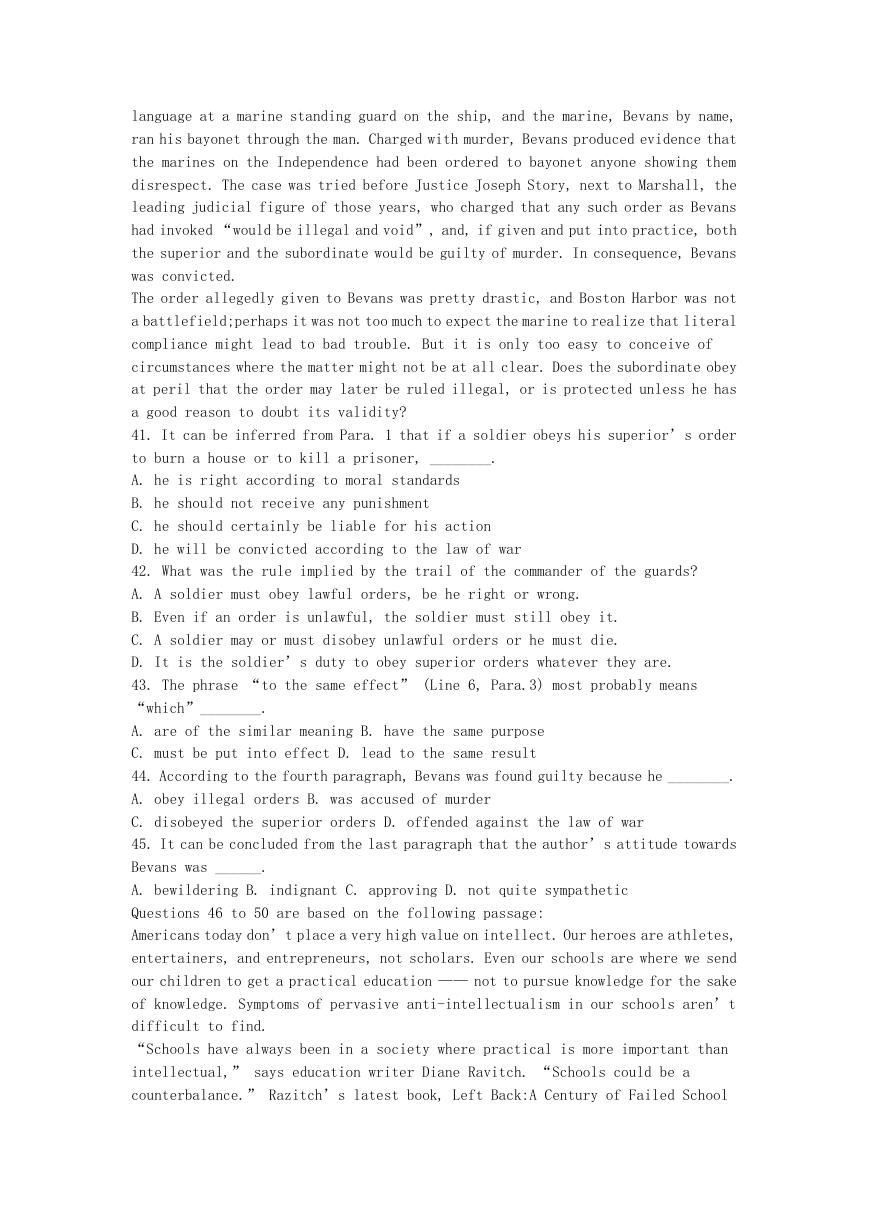
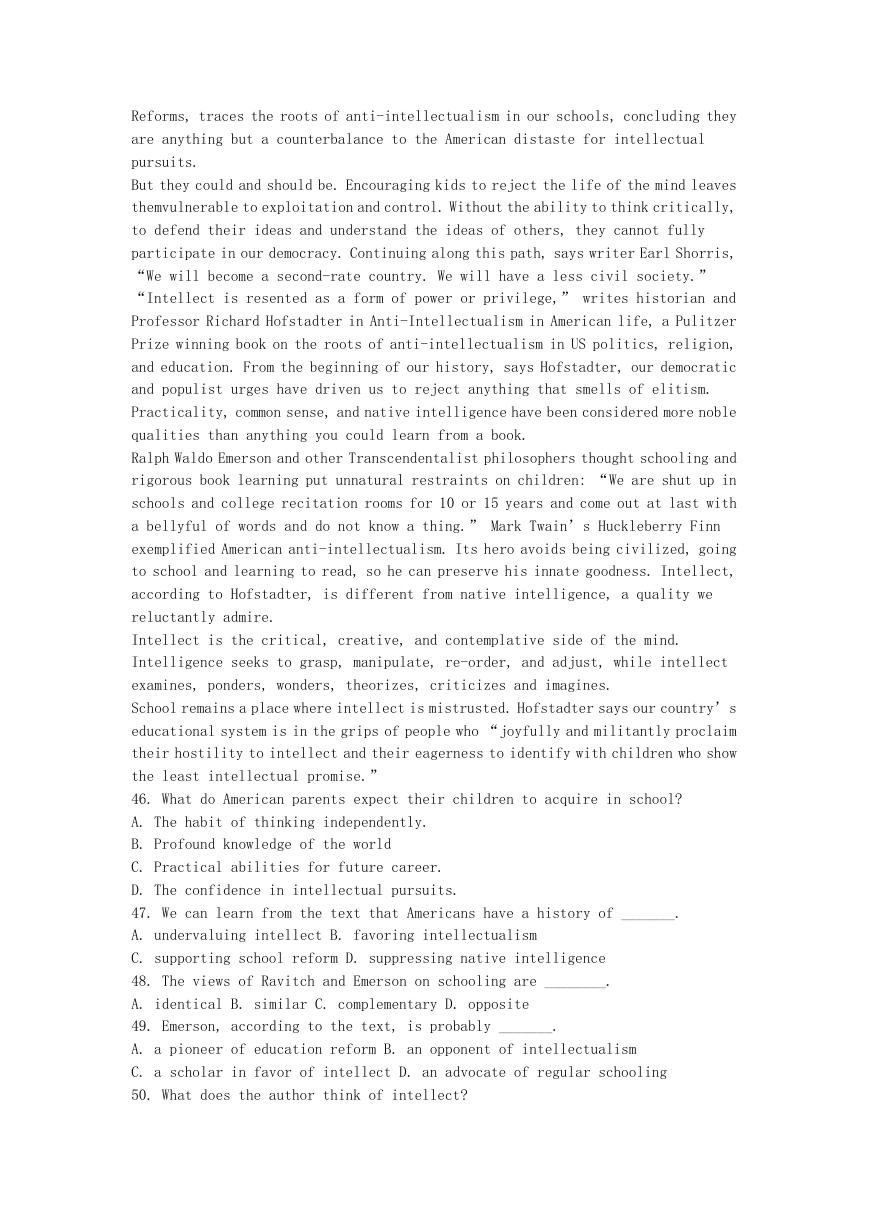
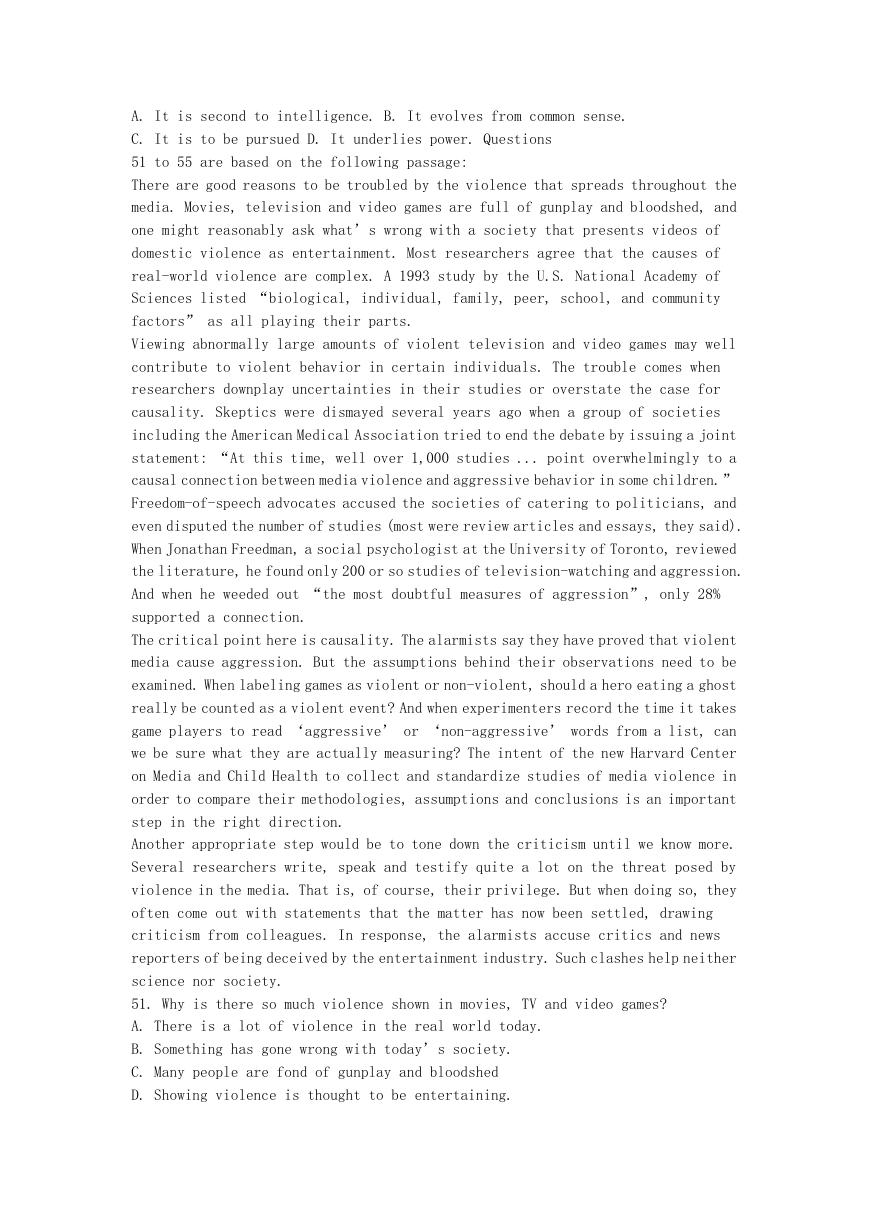
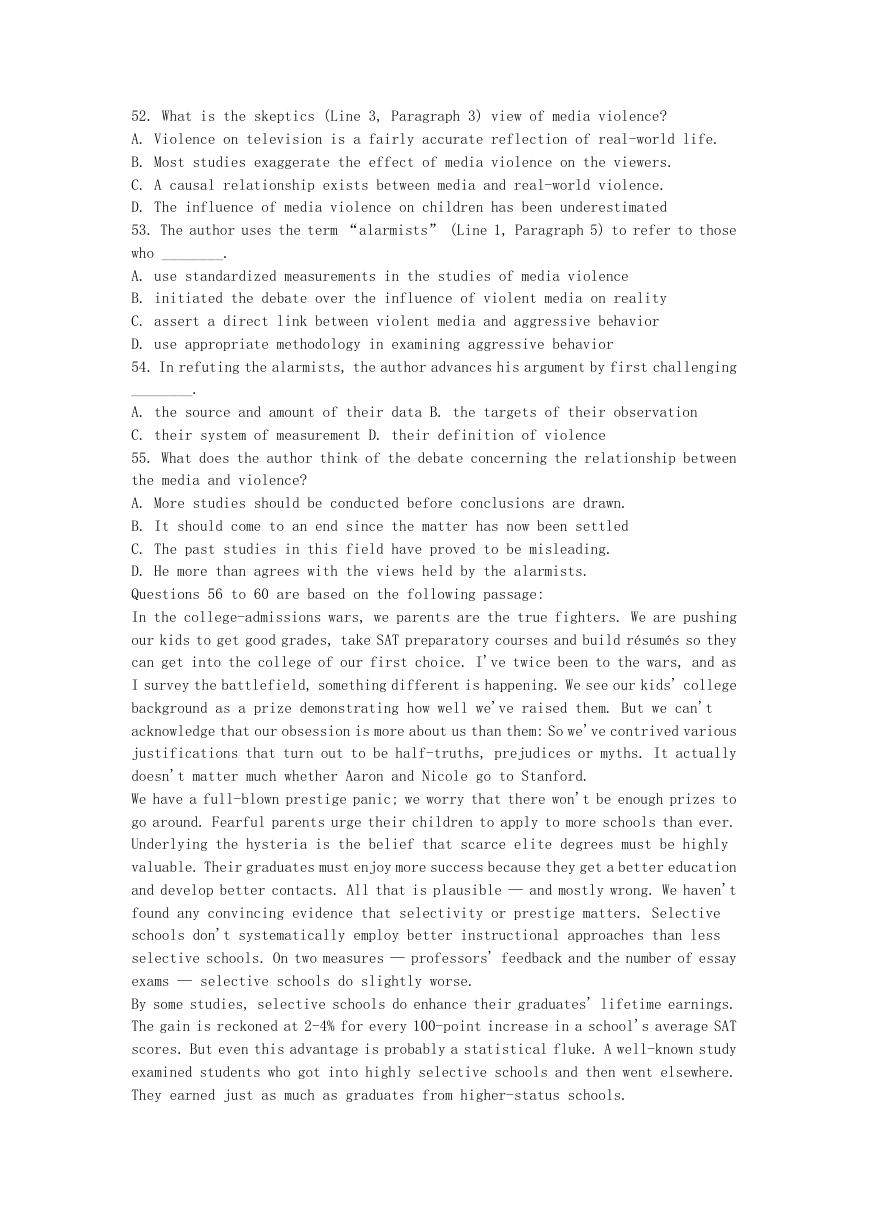
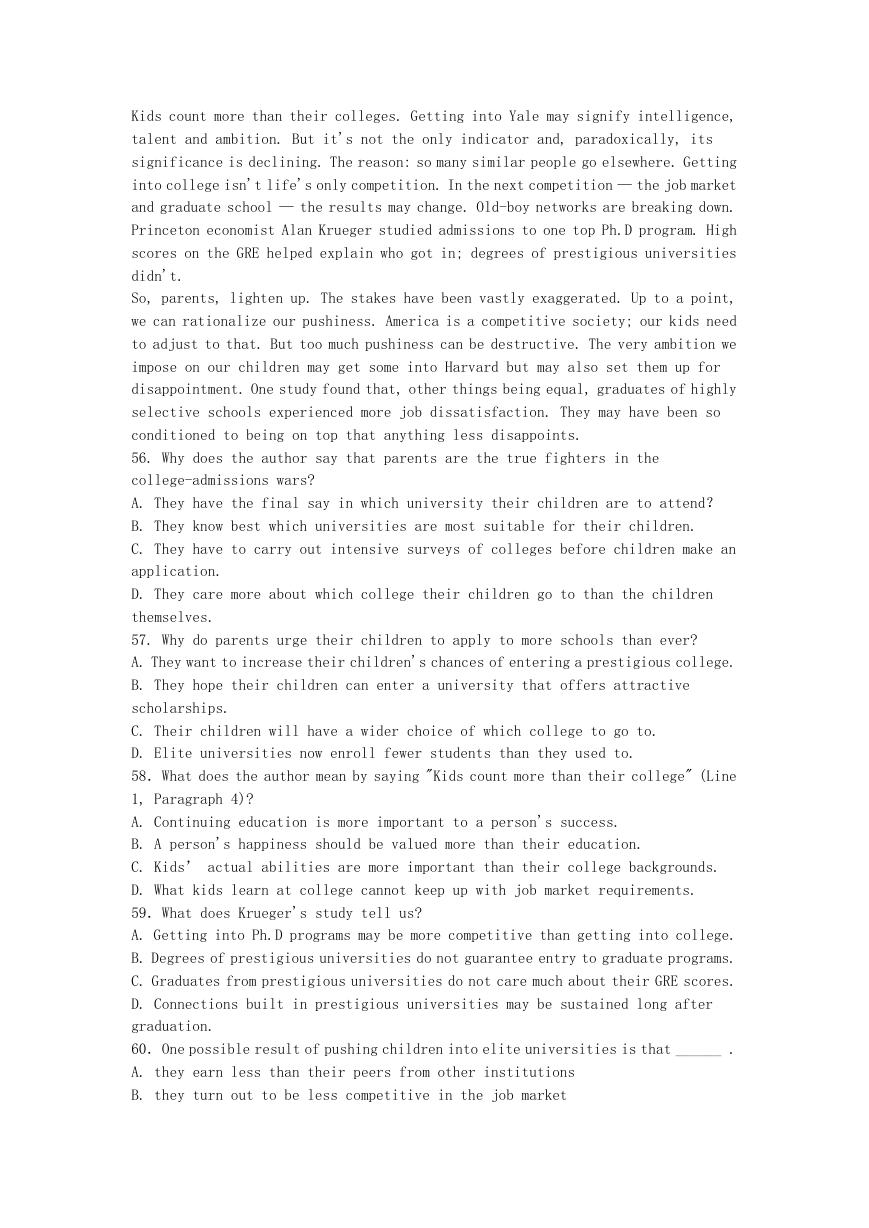








 2023年江西萍乡中考道德与法治真题及答案.doc
2023年江西萍乡中考道德与法治真题及答案.doc 2012年重庆南川中考生物真题及答案.doc
2012年重庆南川中考生物真题及答案.doc 2013年江西师范大学地理学综合及文艺理论基础考研真题.doc
2013年江西师范大学地理学综合及文艺理论基础考研真题.doc 2020年四川甘孜小升初语文真题及答案I卷.doc
2020年四川甘孜小升初语文真题及答案I卷.doc 2020年注册岩土工程师专业基础考试真题及答案.doc
2020年注册岩土工程师专业基础考试真题及答案.doc 2023-2024学年福建省厦门市九年级上学期数学月考试题及答案.doc
2023-2024学年福建省厦门市九年级上学期数学月考试题及答案.doc 2021-2022学年辽宁省沈阳市大东区九年级上学期语文期末试题及答案.doc
2021-2022学年辽宁省沈阳市大东区九年级上学期语文期末试题及答案.doc 2022-2023学年北京东城区初三第一学期物理期末试卷及答案.doc
2022-2023学年北京东城区初三第一学期物理期末试卷及答案.doc 2018上半年江西教师资格初中地理学科知识与教学能力真题及答案.doc
2018上半年江西教师资格初中地理学科知识与教学能力真题及答案.doc 2012年河北国家公务员申论考试真题及答案-省级.doc
2012年河北国家公务员申论考试真题及答案-省级.doc 2020-2021学年江苏省扬州市江都区邵樊片九年级上学期数学第一次质量检测试题及答案.doc
2020-2021学年江苏省扬州市江都区邵樊片九年级上学期数学第一次质量检测试题及答案.doc 2022下半年黑龙江教师资格证中学综合素质真题及答案.doc
2022下半年黑龙江教师资格证中学综合素质真题及答案.doc